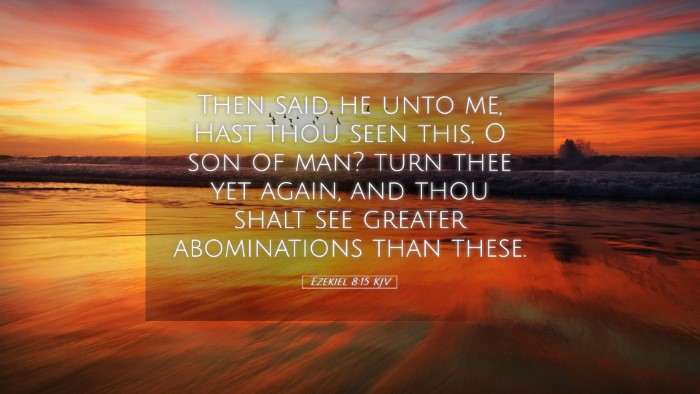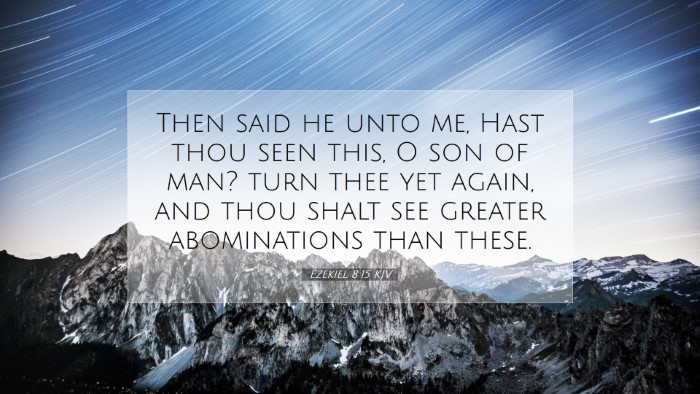Ezekiel 8:15 Commentary
Bible Verse: "Then he said unto me, Hast thou seen this, O son of man? turn thee yet again, and thou shalt see greater abominations than these." (Ezekiel 8:15)
Introductory Thoughts
The verses preceding Ezekiel 8:15 set the stage for a profound revelation of the spiritual corruption within Jerusalem. This verse draws attention to deeper layers of iniquity, suggesting that the abominations witnessed are only the beginning. The Lord instructs Ezekiel to look again, indicating that there are more grievous sins yet to be unveiled.
Exegesis
This passage serves as a transition in the vision given to Ezekiel. The repeated instruction to "turn thee yet again" signifies the need to delve deeper into the sinful practices of the people. Each revelation is intended to shock, confront, and lead to repentance.
Matthew Henry’s Commentary
Henry emphasizes the gravity of the sins that Ezekiel is about to witness, connecting them to the covenant relationship between God and Israel. He notes that the phrase "greater abominations" indicates a deteriorating state of the nation, where the sin is not only pervasive but escalating in severity. The focus on the "son of man" reflects God’s concern for human beings, asking Ezekiel to grasp the weight of these offenses against holiness.
Albert Barnes’ Insights
Barnes elaborates on the significance of the phrase "hast thou seen this?" which serves to engage Ezekiel personally in the vision. This personal involvement underscores the severity of the sins that Israel had committed, not just against the law but directly against their relationship with God. Barnes suggests that this phrase is meant to provoke deep self-examination among the people of Israel and to remind them of their moral failures.
Impact on Spiritual Leadership
- Pastoral Reflection: Pastors are called to observe and identify the spiritual health of their congregations. Just as Ezekiel is encouraged to look deeper, church leaders must examine the state of their flock with an understanding that deeper issues may lie beneath the surface.
- Theological Implications: This passage reminds theologians of the seriousness of divine judgment and the necessity of addressing sin in its various forms. It is an invitation for deeper theological reflection on the nature of sin and its manifestations within the community of faith.
Adam Clarke’s Commentary
Clarke interprets "greater abominations" as not only referring to physical idolatry but also to spiritual adulteries that lead the people further away from God. He contextualizes this by discussing the spiritual complacency that settles into communities when leaders fail to confront sin. Clarke meticulously records the historical context of Israel, illustrating how past rebellions contribute to the present spiritual malaise.
The Call to Accountability
- Self-Examination: Clarke encourages believers and congregations to examine their practices and beliefs, asking whether they too have adopted abominations that distance them from God.
- Community Repentance: Clarke's insight points towards a collective need for repentance in the community of faith; recognizing idolatry in form of secularism or moral laxity may lead to genuine revival.
Theological Reflections
The underlying message of Ezekiel 8:15 provides a profound understanding of God’s holiness juxtaposed against human sinfulness. It requires a re-evaluation of both personal faith and corporate worship. The call to look again implies a divine expectation of awareness and action in response to discovered sin.
God’s Desire for Repentance
God's relentless pursuit of His people is apparent through His reminders for Ezekiel to observe more. This underscores His patience and the longing for repentance, showcasing a God who desires to restore rather than condemn.
Concluding Thoughts
Ezekiel 8:15 serves as a crucial reminder that recognition of sin must be followed by action. The greater abominations that Ezekiel is about to witness symbolize the depth of human depravity and the dire need for divine intervention. For pastors, students, and theologians, this verse calls for courageous leadership in confronting sin, nurturing accountability, and fostering authentic repentance within the body of Christ.


